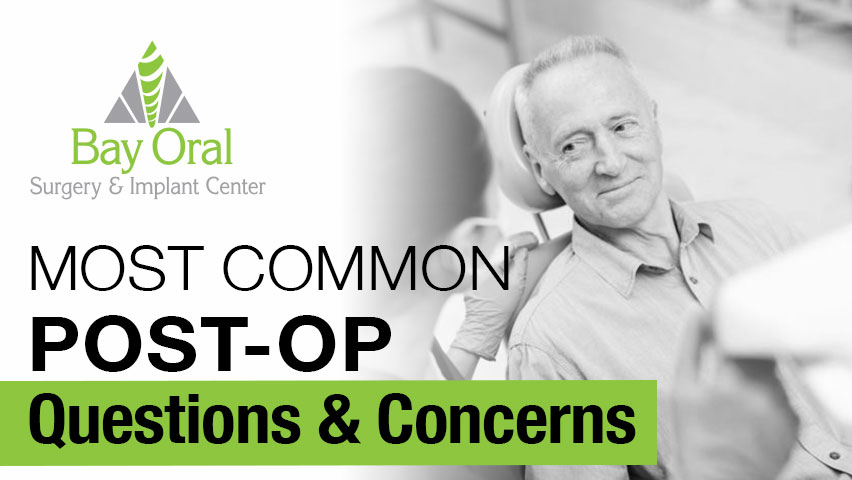
Proper care and healing of your surgical site after undergoing oral surgery is important, and with that comes a lot of questions, which is to be expected. Here are some common post-operative questions from patients:
Can I eat after surgery?
Adequate food and fluid intake after oral surgery is important. Please eat whatever is comfortable to you; however, you may find that softer foods are easier (ex. jello, pudding, applesauce, ice cream, yogurt, cottage cheese, mashed potatoes, noodles, etc). If you are required to be on a no-chew diet, your doctor will provide you with dietary instructions.
Can I brush my teeth like normal after surgery?
On the day of your surgery, do not spit or rinse your mouth. You can use a wet toothbrush to clean your teeth, but do not use toothpaste.
On the day after oral surgery, you can brush your teeth as you normally would again. When brushing, be gentle in the extraction sites as they may be tender for a few days following the procedure. Brush as well as you can and rinse with salt water to aid in healing (1/2 teaspoon table salt in 8 oz warm water) 2-3 times per day. The use of commercial mouthwash is not recommended during the healing period.
A syringe, if provided, should not be used until one week after surgery. Use it to flush out the extraction site(s) as often as needed.
How do I know if I have a dry socket?
A dry socket (alveolar osteitis) is a painful dental condition that can occur after the extraction of a permanent adult tooth. It can occur at the site of the tooth extraction when the blood clot has been dislodged or has dissolved before the wound fully heals. Exposure of the underlying bone and nerves due to a dry socket results in severe pain. Pain that radiates from the socket to your ear, eye, temple, or neck on the same side of your face as the extraction is a common symptom. Your pain medication may not be as effective. To help minimize the potential for a dry socket:
- Do not use a straw for one week following surgery
- Do not spit or smoke for a least 3-5 days following surgery
How do I avoid an infection and/or how do I know if I have an infection?
Due to the enormous amount of bacteria or germs in the oral cavity, infections do sometimes occur following oral surgery. They usually can be treated simply, and they rarely reappear. To avoid further complications or problems, it is imperative that you follow these instructions:
- Take the antibiotic pills as directed and do not discontinue them until finished with the entire prescription or until the doctor tells you to do so.
- Applying moist heat over the swollen area is usually beneficial.
- Hourly warm salt water rinses are very helpful. Do not disturb your sleep to do this.
- Once treatment is started, you should see a decrease in the swelling and pain within 48-72 hours.
- If the swelling severely limits your ability to open your mouth or causes difficulty with swallowing or breathing, call our office immediately and/or go to the emergency room at the nearest hospital.
- It is imperative that you keep follow-up appointments, and report any significant changes in the pattern of swelling or pain immediately.
- It is not unusual to run a low-grade temperature. Be sure to drink plenty of fluids. Call our office if your temperature exceeds 100 degrees orally.
- It is important to understand that failure to follow any of the instructions as indicated above may result in serious complications, significant detriment to your health, and in some cases may be life-threatening. Your doctor is available to answer any questions concerning your surgery.
Is it normal to be in pain after surgery?
Most routine extractions do not cause much discomfort after the procedure. Over-the-counter medication should relieve your discomfort, unless you have been instructed by your physician not to use them. Taking 600mg of Ibuprofen (i.e. Advil, Motrin) every 6-8 hours will usually provide sufficient relief from pain and swelling. Another good pain reliever is Acetaminophen (Tylenol). If you are given a prescription for pain, please take it as directed. If needed, you may supplement your prescribed pain medication with Ibuprofen (ex. 1/2 tab prescription pain reliever and 3 hours later 600 mg of IBU, Motrin, or Advil).
- Pain is expected after surgery but should be managed with pain medication. If the pain is not manageable, please contact our office at (920) 499-0471.
- If an antibiotic was given, please take as directed. Because antibiotics taken orally can reduce levels of beneficial bacteria, you may want to take yogurt or acidophilus tablets.
- If sutures are used, they will dissolve on their own usually within 2 days but can last for up to 4 weeks.
- During healing, it is common to notice small bone fragments working their way through the gums. These bone chips will fall out on their own, or they can be removed if they are bothersome.
For more post-operative care instructions, visit our post-op page on our website. If you have any questions after your surgery at Bay Oral, please contact us. We are here to help!
